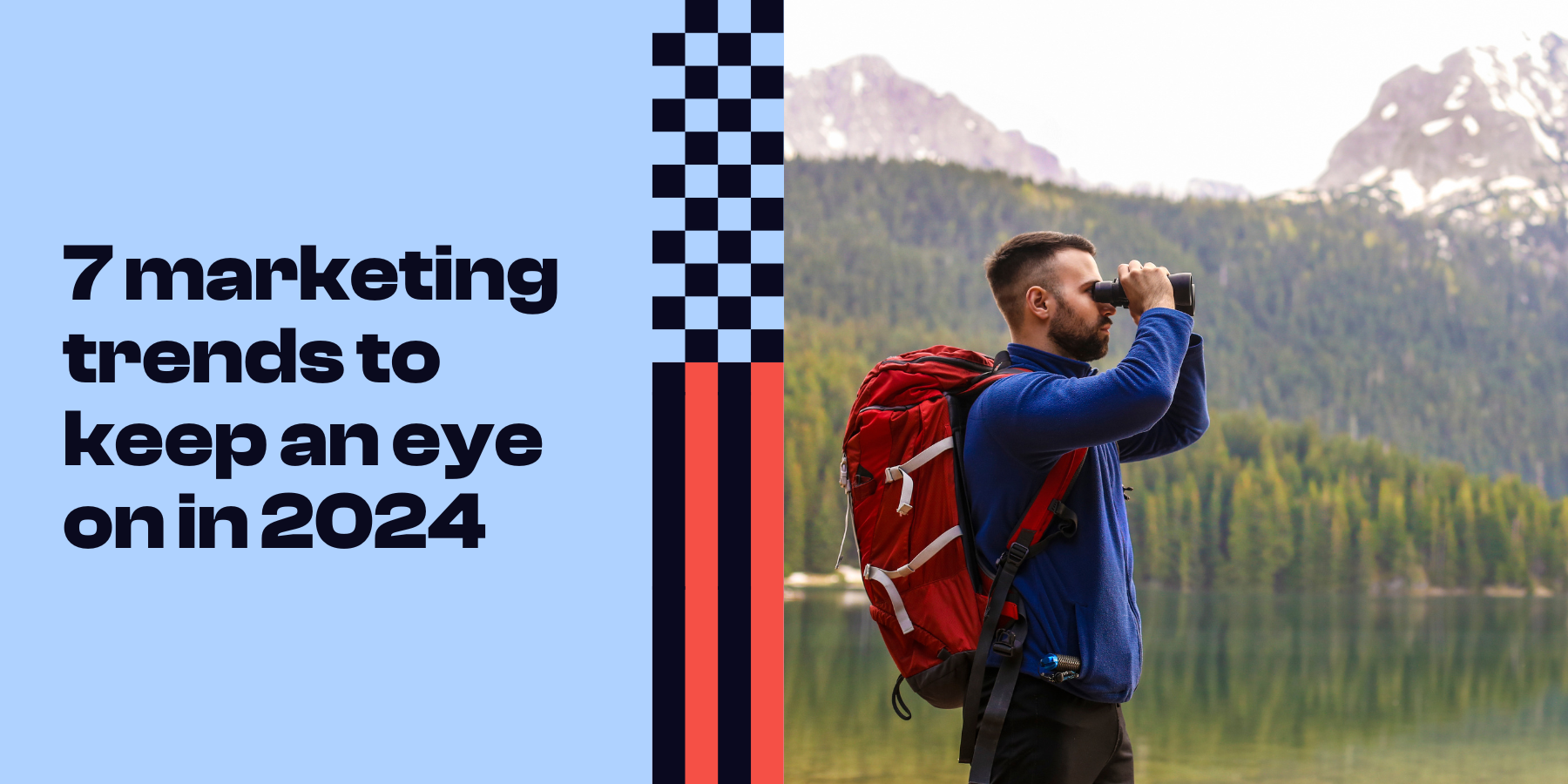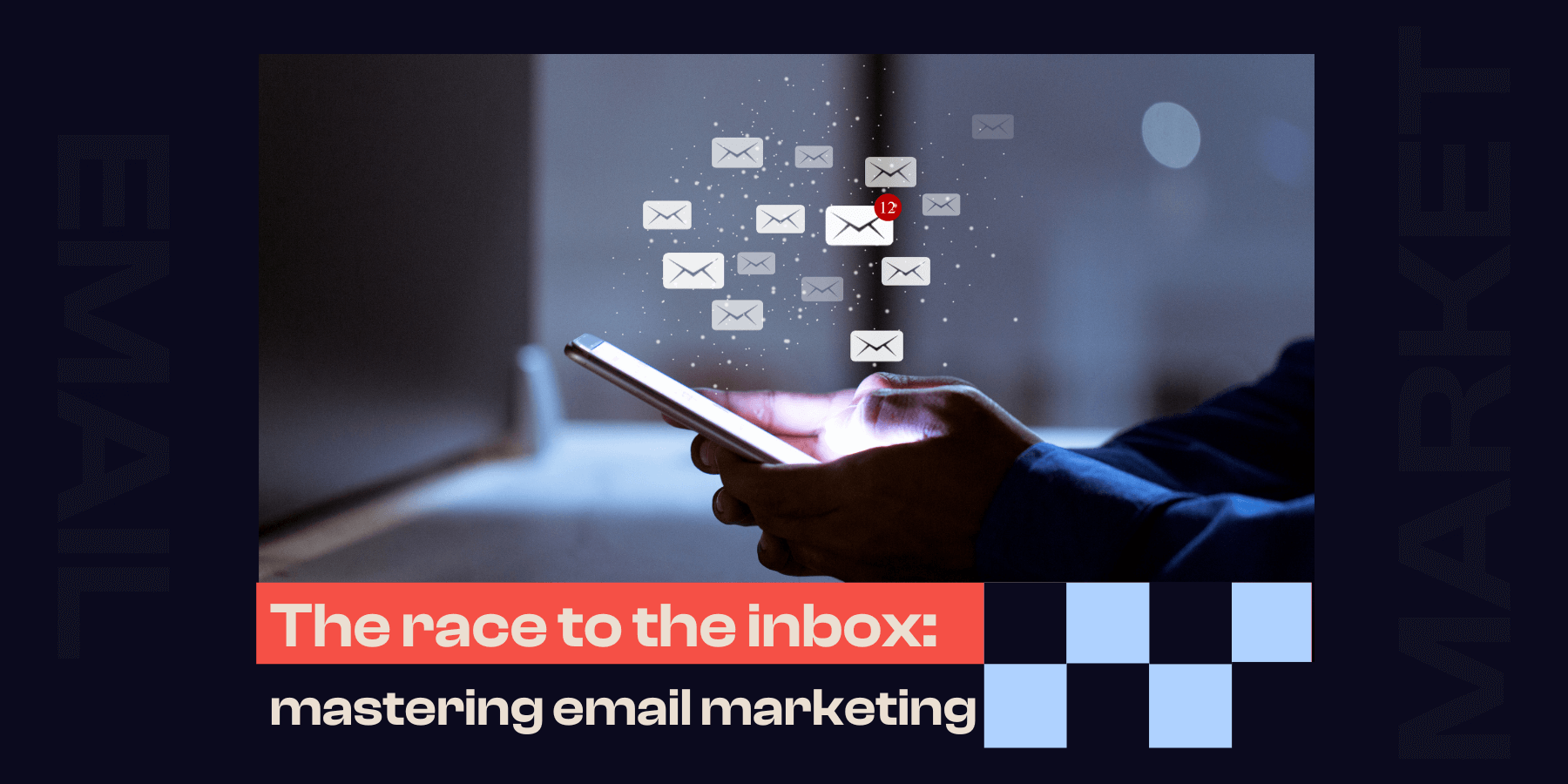7 marketing trends to keep an eye on in 2024

Last updated: 19 December 2024
What a whirlwind 2023 was, we saw the birth of AI technology, new social platforms were born then died off as the marketing world continued to change. As we start the new year, it’s time for us to give you our predictions of what 2024 will look like for marketers.
Here are our 7 marketing trends you should keep in mind this year.
1. Hyper-Personalisation: The era of generic marketing is over
In 2023, we all witnessed the integration of AI technology into the marketing industry. Everywhere you look online, AI has some part in creating that content for businesses. According to HubSpot, ‘64% of marketers are already leveraging AI in their roles’. This number will only increase this year as we see more integration and features from AI.
With the latest advances in technology and data analysis, we’re going to see hyper-personalisation becoming more present. Even with online platforms becoming more strict on their third-party data, machine learning will become more advanced. This enables companies to gather and interpret customer data to deliver highly targeted messages and offers. You will see more personalised content on your feed as businesses cater to their customers' individual needs and preferences.
2. Multi-Touch Attribution (MTA) and Incrementality: Data-Driven Marketing
This year, MTA will be used more in marketing campaigns across different platforms to reach customers. To measure the effectiveness of marketing campaigns, there will be a reliance on MTA and incrementality. Understanding your buyer's journey is crucial, especially now that customers have different pathways when making a purchase. You need to know how customers are coming across your brand and the problems they need solutions for. Once you know why your customers need your brand, then you can campaign across online channels to meet them in the middle.
For effective management of multiple marketing campaigns, it's essential to maintain a well-organised table for tracking performance and metrics. Data will become the cornerstone of successful campaigns. Marketers should leverage data analytics to gain insights into customer behaviour, identify trends, and optimise campaigns for maximum impact. This is essential to ensure you’re profiting from the tactic or strategy you're using in your marketing. A way we do this is by using the HubSpot Campaign feature and viewing the results in the reports' dashboard.
3. Conversational Marketing: The rise of chatbots
The rise of robots has changed the way we market, especially when it comes to conversational marketing tools. The customer experience process is changing with the use of chatbots and live chat, which are impacting how you communicate with your customers. They offer personalised real-time support to guide customers through the buying process when they need it. You can concentrate on your work without missing out on a sale due to delayed response to customer's inquiries.
Every year, we notice that customers' attention spans are getting shorter, which means they can't stand being in limbo, waiting for a response. If you haven’t had any experience with chatbots, why not try it out? You can talk to ours in the bottom right corner.
4. Interactive Content: AI taking the jobs of Videographers?
Late last year, we saw AI starting to take over the video side of marketing. We’ve seen augmented reality (AR), virtual reality (VR) and interactive videos gain prominence online. This allows for deeper immersion and participation for the customers, enhancing the experience and engagement of viewers. Which allows businesses to get results without having to spend big dollars on video production. Google says that ‘marketers who use Google’s AI-powered video reach campaigns see 3.7x return on ad spend compared to those who don’t’.
This can be a great way to save time and resources on your marketing, but at what cost? We believe that this technology has potential but requires some fine-tuning to achieve perfection. Don’t worry Videographers, AI won’t take your jobs. There still needs to be a human to look over the AI work and ensure it’s accurate for your business. If you want to have a go at creating your own AI-generated video then check out this site: https://invideo.io/
The importance of creating engaging videos will also continue to be seen in short-form platforms. Yes, TikTok, Instagram Reels and YouTube Shorts aren’t going anywhere; they will continue to dominate social media. These will be crucial in conveying your brand’s message and the attention of viewers in snackable video shorts.
5. Influencer Marketing and UGC: Building trust with micro influencers
Gone are the days of macro-influencers with a large following, promoting products or services to the masses. 2024 will be the rise of micro and nano-influencers, utilising the everyday person and not celebrities. Last year we saw an increase in content creators and the demise of influencer culture. It doesn’t mean influencer marketing is no longer a powerful tool for reaching target audiences. and building brand credibility. However, businesses need to partner with influencers that align with their values and can make a genuine connection with viewers.
User-generated content (UGC) remains an important resource in building trust, authenticity and engagement. Your audience craves various forms of content, including customer reviews, social media posts, and product testimonials. This content plays a crucial role in aiding their purchasing decisions.
6. Omnichannel Marketing: Across online and offline channels
Seamless integration of marketing channels across online and offline touchpoints will be crucial. Omnichannel marketing ensures a consistent customer experience regardless of the channel they interact with. Businesses can effortlessly interact with their customers across various platforms such as their websites, social media, physical stores, or mobile apps. By providing a unified and cohesive experience, omnichannel marketing can greatly enhance customer satisfaction and loyalty.
7. Ethical Marketing: Data security and privacy
Consumers want brands to be transparent and ethical. They are more cautious about sharing their information due to past data breaches. This has led to a growing interest in companies that prioritise data privacy and ethical standards. The Chrome phaseout of third-party cookies makes marketing campaigns that solely focus on leveraging third-party cookies underperform. This increases the importance of knowing who your buyers are and why they choose you over others in your category.
Brands now have to prove their commitment to privacy through actions, not just words. To gain and keep trust, businesses will focus on sustainability, social responsibility, and data privacy, making it a competitive advantage. Businesses need to build trust with customers for long-term success. They should invest in transparent privacy practices to show they are dedicated to protecting consumer data. Consumers are shifting towards ethical and sustainable choices. This will impact their purchasing decisions and make them more loyal to brands that prioritise these values.
Ready to get your marketing into gear?
Staying on top of the ever-changing landscape of technology and trends can be a daunting task. But fear not, because we are here to guide you through the world of marketing. As your trusted marketing experts, we are committed to providing you with the knowledge and insights you need to thrive in the industry.
If anything we've mentioned has sparked your interest or if you're eager to learn more, don't hesitate to contact our team of experts. They'll provide you with valuable insights on how to effectively incorporate these strategies into your marketing efforts for 2024.








